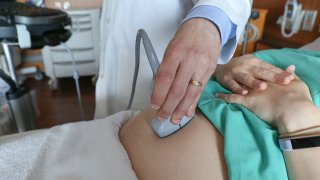
So, I was right! I am not alone in all the questions I have regarding COVID-19 and pregnancy. You have lots of questions, too. Here is a list of the topics that kept coming up in my conversations with those of you that reached out:
- Availability for COVID-19 testing for pregnant women
- Fertility treatments & family planning
- Changing policies regarding doctor appointments & hospital visits
- Breastfeeding concerns
- Support groups & mental health during social distancing
Until then, here’s a portion of my recent conversation with Dr. Emily Adhikari about COVID-19 and pregnancy.
Dr. Adhikari is an OB/GYN at Dallas' Parkland Hospital and Assistant Professor, Division of Maternal-Fetal Medicine for the Department of Obstetrics and Gynecology at UT Southwestern Medical Center. This conversation has been edited for length.
First off -- what do we know about COVID-19 and pregnancy?
What we know about pregnant women and COVID-19 is that the severity is not significantly different from a non-pregnant person. So in the majority of cases, around 80%, they might be very mild & not cause major complications with the woman’s health or with her pregnancy. A smaller percentage may become more severe and that is most likely dictated by the other co-morbidity or other health problems that a mother may have.
Local
The latest news from around North Texas.
Is there any greater risk for COVID-19 for a woman depending on what stage she is during her pregnancy? First trimester versus third?
We don’t think there is a greater risk of acquisition of [COVID-19]. That is much more determined by social distancing and contacts and the risk of a person, in general. The potential risk for a pregnant woman has more to do with when we know the normal physiological changes in a pregnancy mean that as a woman’s gestational age advances – as she gets into the later stages of her pregnancy – particularly those last few weeks of pregnancy – a woman’s pulmonary status, her pulmonary reserve is decreased and that’s a normal thing. It’s because of her advancing pregnancy and the larger size uterus, the flattening of the diaphragm, all of that.
So are women in their third-trimester at greater risk for being hospitalized?
There’s potential and our experience with influenza teaches that there’s potential for that to then compromise a woman’s ability to accommodate infections and to respond to infections. We often have to increase our respiratory rate and if a woman doesn’t have as much reserve volume in her lungs she may go downhill faster. So there’s that potential but it doesn’t mean it has more to do with the infection itself but more with the gestational age.
It seems there is still a lot we don’t know when it comes to COVID-19 and pregnancy.
Yes. There’s a lot we don’t know about all of the things we just talked about – whether or not a woman is more susceptible – we don’t know that. We don’t have any evidence of that so far but again there are not enough studies out there and you can’t do a clinical trial on this sort of thing so it becomes a matter of experience and observation and analysis of the data. And we’re acquiring that right now.
Are you learning a lot from what’s happening in New York?
Yes. Our colleagues in New York have fortunately described their experiences in pregnancy and we’ve learned a lot from that and certainly tried to change our practice and habits with pregnant women according to what they’ve seen.
How unusual is it for you as a physician to be learning new information about this every day?
Well, we all try to learn new information every day. Learning never stops as a physician, but [with COVID-19] it’s a firehose of information and the challenge is being able to process all of that information. A lot of the information we have now is experience and anecdotes. We have to take that information and know there are different levels of evidence and because there is one experience that may differ from another experience, it doesn’t necessarily mean that one is right and one is wrong. It’s important to understand that scientific evidence requires certain standards and right now we’re getting a fountain of experience and anecdote and less scientific evidence.
Best advice for pregnant women right now?
The recommendations for staying at home are the recommendations that should be followed. Stay at home except for those essential needs. Don’t ever touch your face in public. Wash your hands. Those general recommendations from the CDC are the best way to keep you safe.
How to Avoid COVID-19 Infection:
The best way to prevent infection is to take precautions to avoid exposure to this virus, which are similar to the precautions you take to avoid the flu. CDC always recommends these everyday actions to help prevent the spread of respiratory viruses, including:
- Wash your hands often with soap and water for at least 20 seconds. If soap and water are not available, use an alcohol-based hand sanitizer.
- Avoid touching your eyes, nose, and mouth with unwashed hands.
- Avoid close contact with people who are sick.
- Stay home when you are sick.
- Cover your cough or sneeze with a tissue, then throw the tissue in the trash.
- Clean and disinfect frequently touched objects and surfaces.
*Information shared from the Office of Texas Gov. Greg Abbott



